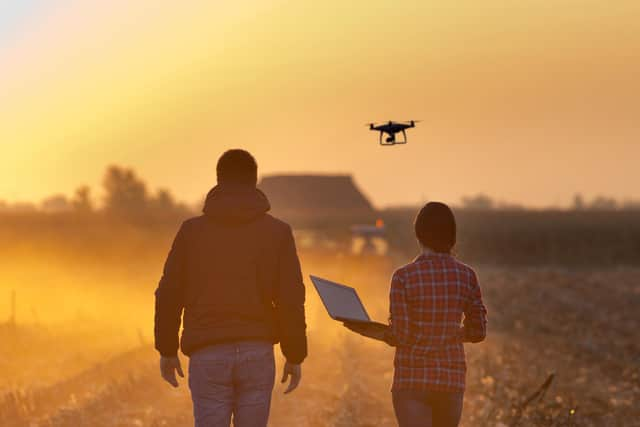Podcast: how technology is changing the rural jobs market and what skills are in demand
Experts described how a range of tech was being deployed by rural businesses - from virtual electric fences to keep in livestock to 'smart' sprayers that identify weeds and use only the correct herbicide to kill them.
Wearable technology to provide health and welfare information on animals, and mapping using drones, is also increasing - with data provided by a range of devices offering vital insights to improve decision-making.
However, poor rural connectivity is a big problem. Emily Grant, a farmer who also runs rural consultancy Forrit, said: "In many ways, technology removes the barriers of distance, so we can connect people. Someone in Shetland can be at the same meeting as somebody from Dumfries and Galloway. However, although we can remove barriers of distance by having these virtual connections, it can become a hindrance because even streaming a bit of video is a whole lot harder in rural areas."


Professor Davy McCracken, from Scotland s Rural College, said: "Connectivity of all types, not just broadband, is required if we're going to actually make technology work to best effect in these more remote rural areas. Most technologies, whether a sensor on a machine, or a tag on our livestock rely on collecting information, but it needs to be set back to be either directly to a computer or up to the cloud. That all requires improved connectivity."
He also stresses that the human element will always remain vital when working in rural areas: "Tech is only a bit of kit gathering information. You still need to be able to interpret that. The human element will always need to be there."
Liz Barron-Majerik, Director of Lantra Scotland, which provides training and awards qualifications for land-based industries, said a big focus is ensuring skills are passed on: "We have high levels of attrition and an ageing workforce. It's making sure those skills are passed to the next generation, which is why we're working so closely with SkillSeeder, which has an app that will allow people with skills to share them, whether that's fencing or lambing. It's a much easier way to connect people looking for skills to people who have those skills to share. I think that's going to be quite powerful in the future."
Lantra is also using 'industry champions': industry champions to share knowledge with a new generation: "They are so willing to share their experiences with others and trying to attract others into the sector. They're sharing experiences, talking about the best way to do it and it's coming from the horse's mouth - so to speak."
FutureWork is available to subscribe toon Anchor FM and wherever you get your podcasts.